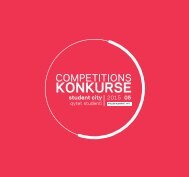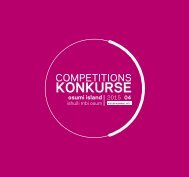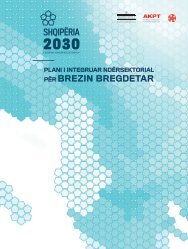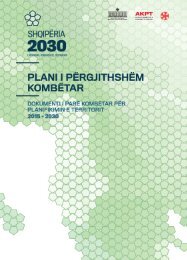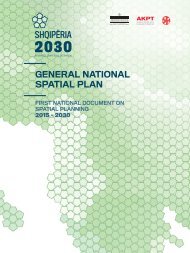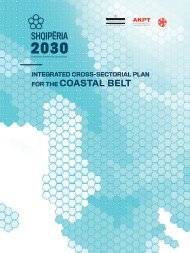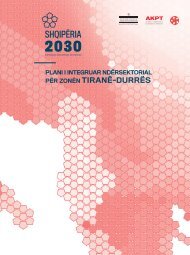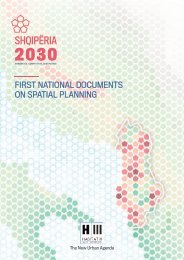Integrated Cross-Sectorial Plan of Tirana-Durres Area
The Albanian Government and the National Spatial Plan have identified the Tiranë-Durrës area, as one of the most important economic areas of the country, and of the Balkan region. To ensure a sustainable territorial and urban development of this area, the Ministry of Urban Development in cooperation with the National Territorial Planning Agency has taken the initiative to draft a Cross-sectoral Integrated Plan for the economic area Tiranë – Durrës. The metropolitan region under study includes territories administered by 5 municipalities: Tiranë, Durrës, Vorë, Shijak, Kamëz.
The Albanian Government and the National Spatial Plan have identified the Tiranë-Durrës area, as one of the most important economic areas of the country, and of the Balkan region. To ensure a sustainable territorial and urban development of this area, the Ministry of Urban Development in cooperation with the National Territorial Planning Agency has taken the initiative to draft a Cross-sectoral Integrated Plan for the economic area Tiranë – Durrës. The metropolitan region under study includes territories administered by 5 municipalities: Tiranë, Durrës, Vorë, Shijak, Kamëz.
Create successful ePaper yourself
Turn your PDF publications into a flip-book with our unique Google optimized e-Paper software.
competitiveness, focusing on a globally<br />
interconnected economy. This means that they<br />
should foster cooperation between regional<br />
actors for the development <strong>of</strong> the enterprise’s<br />
economic network by providing supportive<br />
conditions and platforms for regional actors<br />
to operate as complementary and competitive<br />
units <strong>of</strong> each other, supported by research<br />
and development for innovation, for globally<br />
operating branded products.<br />
2. Developing social capital: networks, ties,<br />
trust, distribution <strong>of</strong> values and behaviours<br />
<strong>of</strong> the population. Both central and local<br />
governments should provide the right<br />
environment to increase productivity per<br />
person, by developing fiscal and legal<br />
instruments in support <strong>of</strong> human capital,<br />
lifelong knowledge and skills, ensuring<br />
that the potential and dissemination <strong>of</strong><br />
development is maximized so that the entire<br />
region can contribute and take advantage <strong>of</strong><br />
the positive results.<br />
3. Developing human knowledge capital: skills,<br />
knowledge, creativity. Creating dedicated<br />
frameworks, platforms and grants that support<br />
and promote research and development<br />
investment to ensure that the region continues<br />
to play a leading role in the knowledge-based<br />
economy network. Building the “knowledge<br />
economy” will serve to create a region with a<br />
focus on the innovation <strong>of</strong> regional enterprise<br />
products, where the latter will reach the right<br />
climate to create globally known brands.<br />
4. Developing the physical capital and<br />
supporting infrastructure for the production<br />
<strong>of</strong> goods and services (transport networks,<br />
ICT communication networks, technological<br />
development areas, buildings, machinery,<br />
etc.). Infrastructural development <strong>of</strong> the region<br />
should rely on investments and projects that<br />
foster municipal cooperation to work under<br />
a regional development framework, ensuring<br />
efficient mobility, safe energy supply with clean<br />
energy and low environmental pollution. The<br />
development <strong>of</strong> strategic mobility and ICT<br />
infrastructure are basic factors for promoting<br />
the achievement <strong>of</strong> development poles. As<br />
such, these networks should be supported<br />
by the development <strong>of</strong> the regional gateways<br />
to provide the necessary regional links with<br />
the Western Balkans and the Mediterranean<br />
countries.<br />
5. The region needs to provide efficient<br />
platforms and services based on smart<br />
technologies that promote information and<br />
decision-making <strong>of</strong> local residents in the<br />
implementation <strong>of</strong> local democracy.<br />
This approach will provide a framework that<br />
facilitates and promotes interaction with<br />
residents and businesses by creating proactive<br />
decision-making on future development<br />
directions.<br />
6. Developing environmental capital: the<br />
environmental and natural physical quality<br />
around which people work and live. The<br />
protection and sustainable development <strong>of</strong><br />
the territory should be guided by the creation<br />
<strong>of</strong> an environment <strong>of</strong> high physical and<br />
environmental quality, promoting a balanced<br />
territorial development within the region.<br />
These steps provide for the establishment <strong>of</strong><br />
a basic framework to return the metropolitan<br />
region into an essential gateway to the Balkans<br />
and the Mediterranean. In order to ensure<br />
a sustainable growth in the 21st century<br />
economy, the plan will foster the development<br />
<strong>of</strong> territorial poles supported by “specialized<br />
employment”, clustering <strong>of</strong> enterprises and<br />
branches <strong>of</strong> the economy, as well as the<br />
development <strong>of</strong> the global value chain. 17<br />
EP1- Develop service economy<br />
Enterprises in the region are shifting the focus<br />
<strong>of</strong> operations from the product manufacturing<br />
economy to the services one. The analysis <strong>of</strong><br />
these regional actors shows that added value<br />
services are attracted mainly to urban centres<br />
in <strong>Tirana</strong> and <strong>Durres</strong>, as the latter provide<br />
physical and digital connections to the network<br />
<strong>of</strong> global urban centres to a satisfactory level.<br />
In this context, the plan supports and promotes<br />
17<br />
http://www.oecd.org/sti/inno/smart-specialisation.pdf<br />
http://s3platform.jrc.ec.europa.eu/documents/20182/96243/Global+Value+Chains+and+Smart+Specialisation+Strategy/8546<br />
d7e1-0219-4ed4-905a-e637731d4846<br />
70






